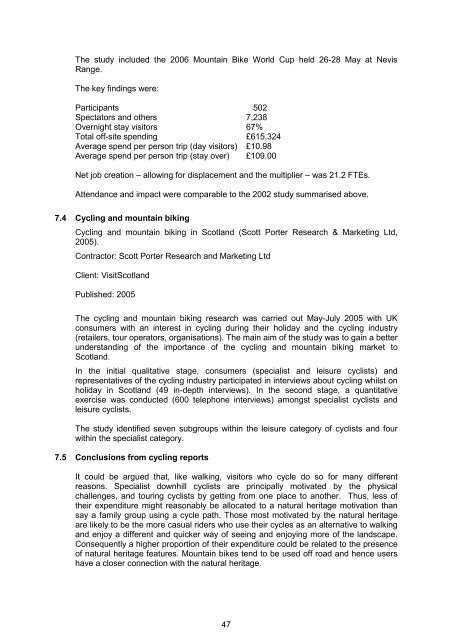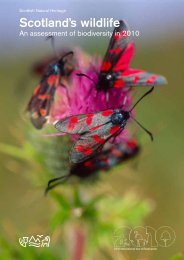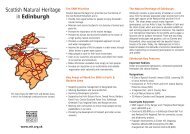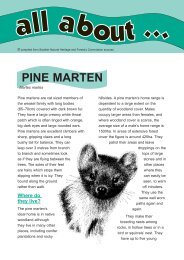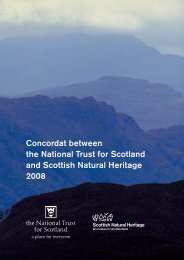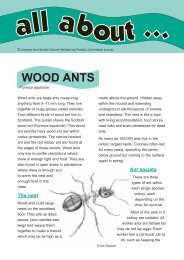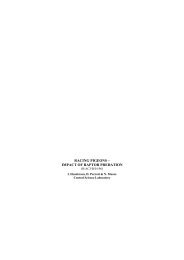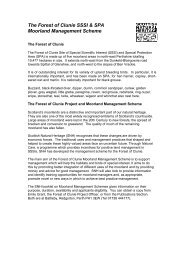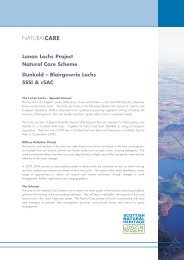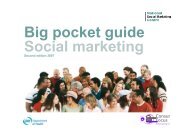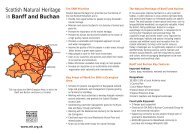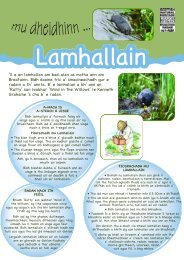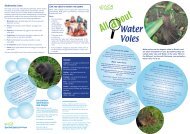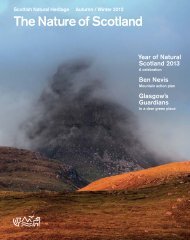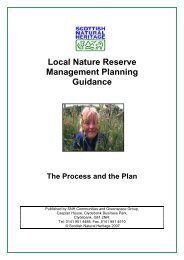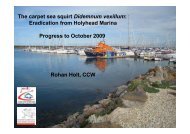Assessing the economic impacts of nature based tourism in Scotland
Assessing the economic impacts of nature based tourism in Scotland
Assessing the economic impacts of nature based tourism in Scotland
You also want an ePaper? Increase the reach of your titles
YUMPU automatically turns print PDFs into web optimized ePapers that Google loves.
The study <strong>in</strong>cluded <strong>the</strong> 2006 Mounta<strong>in</strong> Bike World Cup held 26-28 May at Nevis<br />
Range.<br />
The key f<strong>in</strong>d<strong>in</strong>gs were:<br />
Participants 502<br />
Spectators and o<strong>the</strong>rs 7,238<br />
Overnight stay visitors 67%<br />
Total <strong>of</strong>f-site spend<strong>in</strong>g £615,324<br />
Average spend per person trip (day visitors) £10.98<br />
Average spend per person trip (stay over) £109.00<br />
Net job creation – allow<strong>in</strong>g for displacement and <strong>the</strong> multiplier – was 21.2 FTEs.<br />
Attendance and impact were comparable to <strong>the</strong> 2002 study summarised above.<br />
7.4 Cycl<strong>in</strong>g and mounta<strong>in</strong> bik<strong>in</strong>g<br />
Cycl<strong>in</strong>g and mounta<strong>in</strong> bik<strong>in</strong>g <strong>in</strong> <strong>Scotland</strong> (Scott Porter Research & Market<strong>in</strong>g Ltd,<br />
2005).<br />
Contractor: Scott Porter Research and Market<strong>in</strong>g Ltd<br />
Client: Visit<strong>Scotland</strong><br />
Published: 2005<br />
The cycl<strong>in</strong>g and mounta<strong>in</strong> bik<strong>in</strong>g research was carried out May-July 2005 with UK<br />
consumers with an <strong>in</strong>terest <strong>in</strong> cycl<strong>in</strong>g dur<strong>in</strong>g <strong>the</strong>ir holiday and <strong>the</strong> cycl<strong>in</strong>g <strong>in</strong>dustry<br />
(retailers, tour operators, organisations). The ma<strong>in</strong> aim <strong>of</strong> <strong>the</strong> study was to ga<strong>in</strong> a better<br />
understand<strong>in</strong>g <strong>of</strong> <strong>the</strong> importance <strong>of</strong> <strong>the</strong> cycl<strong>in</strong>g and mounta<strong>in</strong> bik<strong>in</strong>g market to<br />
<strong>Scotland</strong>.<br />
In <strong>the</strong> <strong>in</strong>itial qualitative stage, consumers (specialist and leisure cyclists) and<br />
representatives <strong>of</strong> <strong>the</strong> cycl<strong>in</strong>g <strong>in</strong>dustry participated <strong>in</strong> <strong>in</strong>terviews about cycl<strong>in</strong>g whilst on<br />
holiday <strong>in</strong> <strong>Scotland</strong> (49 <strong>in</strong>-depth <strong>in</strong>terviews). In <strong>the</strong> second stage, a quantitative<br />
exercise was conducted (600 telephone <strong>in</strong>terviews) amongst specialist cyclists and<br />
leisure cyclists.<br />
The study identified seven subgroups with<strong>in</strong> <strong>the</strong> leisure category <strong>of</strong> cyclists and four<br />
with<strong>in</strong> <strong>the</strong> specialist category.<br />
7.5 Conclusions from cycl<strong>in</strong>g reports<br />
It could be argued that, like walk<strong>in</strong>g, visitors who cycle do so for many different<br />
reasons. Specialist downhill cyclists are pr<strong>in</strong>cipally motivated by <strong>the</strong> physical<br />
challenges, and tour<strong>in</strong>g cyclists by gett<strong>in</strong>g from one place to ano<strong>the</strong>r. Thus, less <strong>of</strong><br />
<strong>the</strong>ir expenditure might reasonably be allocated to a natural heritage motivation than<br />
say a family group us<strong>in</strong>g a cycle path. Those most motivated by <strong>the</strong> natural heritage<br />
are likely to be <strong>the</strong> more casual riders who use <strong>the</strong>ir cycles as an alternative to walk<strong>in</strong>g<br />
and enjoy a different and quicker way <strong>of</strong> see<strong>in</strong>g and enjoy<strong>in</strong>g more <strong>of</strong> <strong>the</strong> landscape.<br />
Consequently a higher proportion <strong>of</strong> <strong>the</strong>ir expenditure could be related to <strong>the</strong> presence<br />
<strong>of</strong> natural heritage features. Mounta<strong>in</strong> bikes tend to be used <strong>of</strong>f road and hence users<br />
have a closer connection with <strong>the</strong> natural heritage.<br />
47


